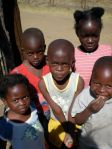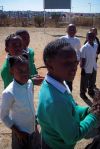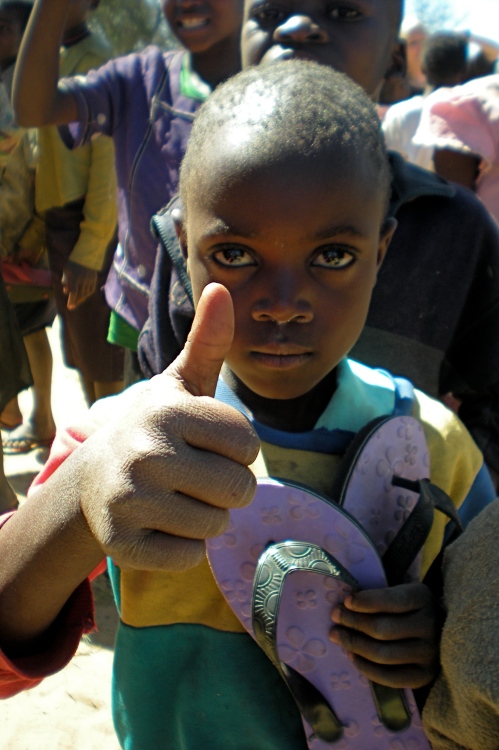
Kooma Village
I’m really strugging with reintry into my 1st-World lifestyle after three weeks in a 3rd-World reality in southern Africa.
I’ve experienced 3rd-World living before. I studied in a tiny town in the middle of nowhere Mexico during college, and built a church in a little village in poverty-stricken central Brazil. And yet, this transition seems harder for me. The situation in Africa — ever more desperate.
In addition to extreme poverty among the citizens, the mass migration of millions fleeing from tyrannical governments, such as Zimbabwe, strains scarce resources to the breaking point.

SnakePark
So, what drew me to Africa? Business? Pleasure? A little of both. This trip was an “occupational survey” for my youngest daughter, who completes her graduate studies in 2010 with a degree in counseling. Her specialty is play therapy, to help children work through traumatic experiences. She has a heart for children of the AIDs epidemic.

Kids from the street.
Her time in South Africa and Mozambique last summer introduced her to the “child-head-of-household” crisis caused by AIDs. With parents dying and children forced to raise their siblings, they are forced into early adulthood without the emotional maturity for the job. My daughter wants to help the children cope with tragedy in their young lives.

JAM: Change a Life. Feed a Child
We embarked on a “survey” of potential organizations where she might contribute her counseling skills. In South Africa, we met with JAM (Joint Aid Management), which feeds starving children across Africa; Door of Hope, which accepts abandoned babies no-questions-asked (CNN reported on Door of Hope the day we visited), Bethany House Trust, a home for orphan and foster children with a holistic approach to treatment and placement; and a Soweto Township Primary School and Day Care. In Zambia, my daughter accompanied a Play Therapy specialist to a local orphanage to meet the children.
I offer a few observations from the trip.

Nelson Mandela poster in school.
We saw and spoke with people on both sides of the apartheid system of government in South Africa, which is a relatively new democracy after the handover of power from white to black leadership in 1994. South Africa has 1st-World infrastructure in the historical “have” population, and a 3rd-World reality for the have-nots.
In the 19 years since apartheid was abolished, South Africa’s infrastructure for the ‘few’ has been shifted to cover the ‘many’ — straining the country’s resources.

Abandoned Power Station
Electricity, under apartheid, was only available for the white population in the cities. The black townships had no power. Now that the power stations are supporting the total population, the system shuts down regularly. Without new power stations, the infrastructure can’t cope with the demand. Power is often “hijacked” by makeshift power lines strung from the overhead cables to the ground. These wires, when not properly grounded but held down by a pile of rocks, bring tragedy to innocent children playing in the area who stumble across the hot wires.
Desperate people do desperate things.

SnakePark

Woman Fetching Water
In preparation for the upcoming 2010 World Cup events in South Africa, the government of South Africa is providing propane heaters and cooktops to lessen the demand on electricity. One of our cab drivers told us how welcome the propane units are, though he held held little confidence the units could put a dent in the problem. At least, he informed us, his wife could cook for him when the power went out. (I won’t even TOUCH the division of labor between men and women. That would fill an entire book, not a just a blogpost.)

Portia's 1-room tin shack
We visited squatter villages, many filled with destitute emigrants who fled from other countries to the cities in “Hope in Africa.” We met with Portia who came to South Africa from an unnamed neighboring country. She allowed us into her one-room shack. No water. No plumbing. No electricity. She graciously told us about her life (as interpreted by my buddy Mike who speaks a dozen or so languages). Outside her little tin shack she planted little cactus gardens. (You can see her water buckets outside the structure in the picture.)
The human spirit is amazingly abounding, even in the most hopeless times.

Making the best of circumstances

Big Smiles Day Care
Dan (name changed for privacy issues), our escort for a day in the Soweto Township (home of Nelson Mandela, Desmond Tutu, and Dan), is HIV-positive. He told us the story of how he found out. His second son had health issues. After repeatedly taking him in for treatment, the doctor suggested an AIDs test since the boy exhibited the telltale sign of lumps behind his ears. The boy tested positive. Dan’s wife admitted she was HIV-positive. Dan tested positive too. He felt devastated and betrayed. They lost their youngest boy to AIDs. No medicine was available to help him.

Big Smiles Day Care
Dan had two choices: leave his wife or stay with her. The doctor counseled that their healthy son could soon be an orphan, as so many other children who lose both parents to AIDs. The boy should enjoy his parents as long as possible. Dan chose to forgive his wife and stay a family.
On the happy side of this story, Dan and his wife have enrolled in an AIDs program through a US NGO (I’m not sure which one) which gives them drug cocktails for free. He boasted his white blood cell count as being in a really good range. He threw out numbers that met the world to him, yet nothing to me. I had to ask what was a dangerous vs. acceptable number. I admit. I really knew very little about the battle against AIDs beFORE this trip. I am now painfully aware now.
To quote Dan:
Everyone is either infected or affected by AIDs.
Plight of Children:

Primary School Principal
When visiting a primary school in the Soweto Township, the principal spoke to us in a dark office. Power had been out for a couple of weeks. She’d been assured they would have power sometime the following week. She told us of her challenges running the school. Children starve. Their parents die of AIDs. They, themselves, are infected. Older children care for younger siblings. They may or may not have family to help. Many drop out and end up on the streets.

Playground Games
The principal told us a story. One of her young students quit coming to school. She discovered he was caring for his deathly ill Mother, as well as his brothers and sisters. The principal found a hospice organization to take the Mother in. After proper treatment, she returned home to care for her own children.
So, why isn’t the same care available to ALL infected parents?
The principal explained she can’t help when she doesn’t know the family has a problem. Many parents won’t admit they are sick, much less that their children are sick.
Stigma. Shame. Fear.

Can you resist that face?
The government now provides a grain product so that every child has one meal a day at school. The principal told us that she asks for a donation every week from the children that allows her to buy spices, olive oil and other ingredients to add to the porridge-type substance they serve the children — just to give it a flavor. She also has them bring in containers to take the grain home for the days when school is closed. Otherwise, they may not eat until school opens again.
Many of the children experience sexual, physical, and emotional abuse. Rape is rampant. How do you build hope in a child who has so little and so little to live for? (Thankfully, my daughter has skills to help.)
And yet, those with the least keep going…in spite of it all.

Thumbs up after receiving new "tropicals" or flip-flops

Streets of Livingstone
My long-lost aunt Melody and my uncle Phil are missionaries with the people of Zambia. My aunt found me two days after I joined Facebook. She invited us to visit. Since we planned to travel to South Africa, we decided to hop over to Zambia while in the neighborhood. We spent a glorious week with Melody in Livingstone while my uncle was in the US for surgery. Girl-time!
Power is sporatic in the city. Thursday is their “load-shedding” night where the city goes dark for 3-4 hours. I can only assume the government is selling that “saved” electricity to a neighboring country, perhaps. That’s only my speculation. Power went out Saturday morning for several hours, but I’d gotten up early to download pics to Facebook, so I felt proud to beat the outage. No hot breakfast though.

Lion King welcomes Chinese investment.
What surprised me the most? Chinese infrastructure EVERYwhere. Roads. Schools. Buildings. Why, you may wonder? Infrastructure in exchange for mineral rights. Zambia is rich in copper, amethyst, aquamarine, beryl, emerald, tourmaline, garnets and more.

Kooma Village Community School
In comparison to the shantytowns in South Africa, the poverty in the Zambian villages felt hopeful. I know that sounds strange. To me, the squalor of the squatter towns in South Africa felt oppressive, yet the villages felt almost quaint. They looked artistic, picturesque. Even the poverty of a one-room school hut seems idyllic.

Mukuni Village: Home of Lion King
The villages still operate with a strong sense of community. Village elders. Social heirarchy. Family structure. They are established and well-run. The shacktowns, in comparison, come together in chaos of uprooted people with no community ties. Society breaks down. Crime and despair follow.
What’s Next?
So what now? What can I do to make a difference?

Zambian boy
Over 30 years ago, my Daddy felt a burden for starving people in Africa. He tried to persuade our extended family to cut back on lavish Christmas spending and give gifts to those who needed it most. We adopted the idea later when my girls were little. We agreed with family to exchange Christmas ornaments and give donations in family member’s honor. Our girls chose Toys for Tots. We gave them an amount we would normally spend on gifts and let them shop for toys.

Street Boys
We piled the toys into a mountain, took their picture in front of it, and give the picture as our gift to family. In recent years, we’ve given gifts through the World Vision Gift catalog. And last year, after I met with folks from JAM, I give gifts to JAM in my daughters’ names. And yet, these contributions feel so incredibly inadequate.

Mukuni Village Boy
My time in Africa reminded me of Daddy and how God broke his heart for the people of Africa. (And how cool that his youngest brother is now living and serving in Africa!) There I was, in the very place, looking at the very faces he yearned to help.
I want to do more.
Bethany House Trust, a Christian-based organization, stole my heart on this trip. I want to find a way to help get the word out about the amazing things they do in their community. Gert Jonkers told us they spend R4000 per month per child ($510). The government reimburses them R1000 per month ($127). The government is five months behind in payment. Gert and Antoinette have used all their savings to keep Bethany House afloat. In this economy, many like organizations already folded.
$1 each would help. $50 would be a tremendous contribution. I don’t think they are set up for US contributions, but you can contact them directly to see how YOU can help.
So I leave you with this double rainbow I discovered over Victoria Falls. I saw the red flower, walked over to take its picture, and saw the most gorgeous site EVER! What a wonderful sign of hope and new beginnings.

Double Rainbow over Victoria Falls



